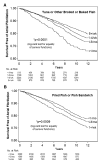Fish intake and risk of incident atrial fibrillation
- PMID: 15262826
- PMCID: PMC1201400
- DOI: 10.1161/01.CIR.0000138154.00779.A5
Fish intake and risk of incident atrial fibrillation
Abstract
Background: Atrial fibrillation (AF) is the most common arrhythmia in clinical practice and is particularly common in the elderly. Although effects of fish intake, including potential antiarrhythmic effects, may favorably influence risk of AF, relationships between fish intake and AF incidence have not been evaluated.
Methods and results: In a prospective, population-based cohort of 4815 adults > or =age 65 years, usual dietary intake was assessed at baseline in 1989 and 1990. Consumption of tuna and other broiled or baked fish correlated with plasma phospholipid long-chain n-3 fatty acids, whereas consumption of fried fish or fish sandwiches (fish burgers) did not. AF incidence was prospectively ascertained on the basis of hospital discharge records and annual electrocardiograms. During 12 years' follow-up, 980 cases of incident AF were diagnosed. In multivariate analyses, consumption of tuna or other broiled or baked fish was inversely associated with incidence of AF, with 28% lower risk with intake 1 to 4 times per week (HR=0.72, 95% CI=0.58 to 0.91, P=0.005), and 31% lower risk with intake > or =5 times per week (HR=0.69, 95% CI=0.52 to 0.91, P=0.008), compared with <1 time per month (P trend=0.004). Results were not materially different after adjustment for preceding myocardial infarction or congestive heart failure. In similar analyses, fried fish/fish sandwich consumption was not associated with lower risk of AF.
Conclusions: Among elderly adults, consumption of tuna or other broiled or baked fish, but not fried fish or fish sandwiches, is associated with lower incidence of AF. Fish intake may influence risk of this common cardiac arrhythmia.
Figures


Comment in
-
Letter regarding article by Mozaffarian et al, "fish intake and risk of incident atrial fibrillation".Circulation. 2005 Feb 1;111(4):e37; author reply e37. doi: 10.1161/01.CIR.0000153849.18138.7C. Circulation. 2005. PMID: 15687118 No abstract available.
References
-
- American Heart Association. Heart Disease and Stroke Statistics—2004 Update Dallas, Tex: American Heart Association; 2003.
-
- Furberg CD, Psaty BM, Manolio TA, et al. Prevalence of AF in elderly subjects—CHS. Am J Cardiol. 1994;74:236–241. - PubMed
-
- Psaty BM, Manolio TA, Kuller LH, et al. Incidence of and risk factors for AF in older adults. Circulation. 1997;96:2455–2461. - PubMed
-
- Aviles RJ, Martin DO, Apperson-Hansen C, et al. Inflammation as a risk factor for AF. Circulation. 2003;108:3006–3010. - PubMed
-
- Movsowitz HD, Lampert C, Jacobs LE, et al. Atrial fibrillation in the elderly. Am J Geriatr Cardiol. 1994;3:26–40. - PubMed
Publication types
MeSH terms
Substances
Grants and funding
LinkOut - more resources
Full Text Sources
Other Literature Sources
Medical

